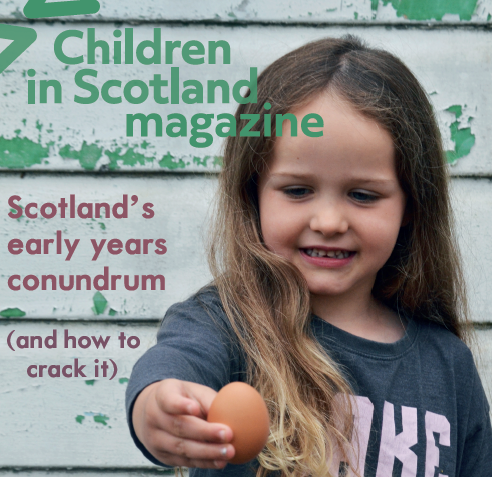A modest proposal
It’s time for a large-scale, unified campaign to transform early years policy in Scotland — and we should all be adding our voices to it, writes Sue Palmer
Whenever I bang on about the need for reform of early years policy to anyone in the political sphere, their faces tend to register incomprehension (What is this woman on about?), pitying condescension (Doesn’t she realise how impossible that would be?) or simple irritation (Oh no, not another one…).
There’s a different reaction from early years professionals in health, childcare, education or social services, of course: they just look tired, resigned and sad. But, as the poverty-related attainment gap widens and mental health problems soar among children and young people, Scotland really must start taking early years seriously.
Getting it right – or wrong – for the early years
The United Nations defines early childhood as birth to eight years and, over the last 70 years, the scientific literature about the significance of early childhood experiences has grown into a mountain. In Northern European countries, where this evidence has been used to develop coherent, well-resourced universal services to support children, families and communities, they’re already reaping the benefits in terms of national wellbeing and educational success.
But in Scotland (as in the rest of the UK), there is as yet no sign of the political and public understanding of child development that underpins these successful Northern European models. What political responsibility there is for the early years has historically been split between health (mainly physical health) and – once they turn five years old – education (starting with the three Rs).
As demand for pre-school care grew during the 1990s, Scotland clearly needed a ‘childcare sector’. But this has been cobbled together over the last 20 years – on the hoof and on the cheap – resulting in widely varying quality and attention to staff training. Most politicians – like the general public – assume that ‘out-of-home childcare’ just means keeping the weans out of harm’s way while their parents are at work.
As Alan Sinclair put it in his recent book Right from the Start: “The way in which tax money is spent in the UK and Scotland flies in the face of all early years’ science. In education, most money per head goes to university education, then secondary school, followed by primary, and last of all pre-school. In health spend, it is the same. Little is spent on the first thousand days of life, with most spent on the last days of life.”
While the accompanying documentation (such as Getting it Right for Every Child and Curriculum for Excellence’s Early Level) is developmentally-informed, this has not been translated into cultural change in terms of understanding and attitudes.
Meanwhile, there have been seismic changes in young children’s lifestyles during those same 30 years which put the two central pillars of early child development – attachment and play – under serious strain.
Twenty-first century parental working patterns have led to a massive expansion of out-of-home childcare, from an increasingly early age, and higher road traffic has combined with fragmenting communities to deny little children access to active, self-directed outdoor play. The implications of these changes for all aspects of development – physical, social, emotional and cognitive – are immense.
It’s not that the changes went unnoticed. Many professionals in health, childcare and education struggle daily to support the children in their care as well as possible, often in completely inadequate environments. Their work is supported by third sector organisations such as Home Start, Parenting across Scotland, Children First, Play Scotland and Inspiring Scotland’s outdoor play initiatives. But all are hampered by a constant struggle for funding, the short-term nature of most projects and the lack of political interest in anything beyond lip-service.
The emergence in recent years of two grassroots movements with widespread support – ACE-Aware Nation and Upstart Scotland – indicates the frustration felt by professionals across the early years sector, and those beyond early years who recognise the significance of this developmental stage.
But, despite an Early Years Framework, an Early Years Task Force, an Early Years Collaborative and an ever-growing pile of documentary advice and guidance, Scotland is a very long way from the “transformational change” promised by successive governments. Instead, as disadvantaged children are further disadvantaged by lack of attention to basic developmental needs, our nation’s deeply entrenched problems of poverty and ill-health become ever more compounded.
The road to culture change
So, if the aim is a well-funded, coherent, evidence-based early years policy (pre-birth to eight years) with a well-qualified workforce to deliver it, what do we need to do? My suggestion is that every person and every organisation concerned about this problem should work together for large-scale reform.
Many of Children in Scotland’s ’25 Calls for change’ relate to early years policy but, at present, each of the groups concerned concentrates on its own aims, from its own perspective, rather than seeing it as part of a coherent national plan. If specialists in the field put forward piecemeal solutions, we can hardly be surprised if all we get is piecemeal, short-term, inadequately-funded political responses.
I’m suggesting we put our voices together and call for a well-funded, coherent, evidence-based approach to early years policy with a well-qualified workforce. That wouldn’t prevent us from continuing to work within our own specialist fields, but it would help us envisage an overall system into which each jigsaw piece would successfully fit.
As a first move towards the realisation of this big-picture thinking, we could demand the appointment of a Minister for Early Years with real political teeth and financial clout, who could cut across the current political silos (health, childcare, education, social services) to achieve fundamental reform of universal state services. And, since such a minister would need expert advice far beyond that available from civil servants, we must also call for a standing advisory committee drawn from the sectors listed above, as well as specialists in developmental psychology and the new science of play.
A large-scale campaign of this kind would attract plenty of media coverage, creating opportunities to change public perceptions of early childhood. And perhaps this is even more important than the political demands. Imagine the impact on public opinion if all relevant professional organisations shouted loudly in the media about the ill-effects of adverse childhood experiences on physical and mental health, the protective power of focusing on love and play in our universal early years services, and the need to spend tax money at the beginning of children’s lives, rather than trying to mop up problems as the years go by.
The scientific evidence to support such a call is well-supported by the United Nations Convention on the Rights of the Child. Take a look at General Comment 7 (2005) and match it up with any Articles and General Comments you already cite on behalf of children’s rights. Northern Europe has proved how critical it is to get these rights as right as possible, right from the start.
Considering the long-term benefits to health and wellbeing, for individual children and the society they will one day inherit, my suggestion does indeed seem a very modest proposal.
Sue Palmer is Chair of Upstart Scotland and author of several books including Toxic Childhood and Upstart.
To read the full range of content in our early years issue, click here to buy a print copy or subscribe to the magazine for a year by contacting clogan@childreninscotland.org.uk

Children in Scotland Magazine
Find out more about the content in the latest issue of our magazine and how to subscribe
Read more
Upstart Scotland
Find out more about Upstart Scotland, which advocates for a play-based Kindergarten stage
Visit the website